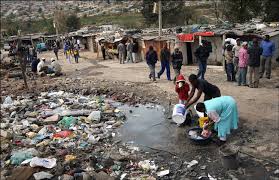LONDON — Most first-time visitors to Cape Town are mesmerized by the majesty of Table Mountain, and wowed by the vivacity of the Victorian-era waterfront. As a new visitor myself last month, I was captivated by both. But what has lodged most in my memory is something very different.
Driving from the international airport, I was struck by the sheer wretchedness of Cape Flats: the series of black townships, comprising mostly shacks with corrugated steel roofs, that stretch from the highway almost to the horizon. Few people — tourists or locals — want to talk about the Cape Flats. But there is no better starting point for a discussion of the state of contemporary South Africa.
I was shocked by the degree to which the predominant emotions, 21 years after the end of apartheid, are not of hope and expectation, but of fear and despair.
For much of the black population, fear and despair arise out of the sense that while South Africa became a democratic nation after apartheid, in many ways very little has changed.
Khayelitsha, the largest township in the Cape Flats, was established in 1983 by the apartheid government to house about 200,000 black workers. According to the 2011 census, almost double that number now live there. More than half live in “informal housing” — shacks, in other words.
Almost four in 10 people are unemployed. Barely one-third have piped water in their dwellings; a quarter have no flush toilets; about one in five has no access to electricity. Many of these figures are worse than they were under apartheid; others are little changed.
Apartheid had an immensely dehumanizing impact. But it also caused communities to forge powerful social bonds and channel anger into resistance and liberation movements.
The destructive effect of contemporary policies has led not to the creation of stronger bonds, but to the unraveling of the fabric of society. The social anthropologist Leslie J. Bank describes it as a form of “fractured urbanism,” in which traditional social organizations have collapsed and forms of social control have dissolved, creating a political and social vacuum.
Unlike under apartheid, there is no obvious target for people’s rage. There are protests, almost daily, against housing conditions, police brutality and political corruption. There is considerable anger against the ruling African National Congress, in both national and local governments. Yet the relationship of people, even of critics, to the A.N.C. is complex. It remains, for most, the party that brought about liberation, and so retains considerable moral legitimacy.
The confusion about whom to blame for conditions that seem little improved from the days of apartheid has often led people to turn on one other. The explosion of xenophobic violence, directed against migrant workers from other African nations, that swept through South Africa in 2008, and again this year, is one expression of this. So is the growing conflict between apartheid-defined categories of people, like “blacks” and “coloreds.”
New conflicts have also emerged, like the one between longtime residents of Cape Town’s townships (who call themselves “borners” — people born in the townships) and immigrants from elsewhere in South Africa. Such divisions have been exacerbated, even exploited, by sections of the A.N.C. As the failure to transform the lives of the poor has eroded support for the party, many A.N.C. politicians have turned to the politics of ethnicity and identity to strengthen their base.
It is a development that has long been evident, but that has really gathered strength under the leadership of South Africa’s current president, Jacob G. Zuma. Mr. Zuma has unashamedly exploited his Zulu identity — “100% Zulu Boy” read the slogan on supporters’ T-shirts before the 2009 general election. And to shore up his support, he has promoted supposedly traditional African values, enhancing, for example, the powers of unelected tribal chiefs.
Last year, his government attempted to pass the Traditional Courts Bill that would have created a separate legal system for millions of people living in the former Bantustans, allowing local chiefs to act as judges, prosecutors and mediators, with no legal representation and no right of appeal.
“Let us solve African problems the African way, not the white man’s way,” Mr. Zuma proclaimed in defense of the law.
“It’s shocking how the language of apartheid now comes out of black mouths,” one former activist said to me.
The situation has been made worse by the issue that dominates South African politics today: corruption. Almost daily, there is a new scandal. Accusations reach up to the highest state office — Mr. Zuma himself has been embroiled in a long-running scandal — and threaten to besmirch the integrity of institutions like the National Prosecuting Authority.
Corruption expresses the way that state patronage has come to define politics. Politics in South Africa today “is devoid of political content,” in the words of a former A.N.C. activist, Raymond Suttner. Instead, “it relates to who is rising or falling, as part of ongoing efforts to secure positions of power and authority.” Using corrupt resources to win favors from different social groups and factions has helped entrench a dangerous cronyism in national politics.
While sections of the political elite have tried to manipulate the politics of ethnicity to bypass democracy, many at the grass-roots level have opposed these moves. Popular opposition killed the Traditional Courts Bill. Last month, a community in the Eastern Cape won a court battle to elect its own leaders, rather than have them imposed. It cannot be right, the courtagreed, that the people of the Transkei region “enjoyed greater democratic rights” under apartheid “than they do under a democratically elected government.”
It is a telling comment on the state of contemporary South Africa that the government can be chastised for being less democratic than it was under apartheid. If the future of South Africa is not to be totally bleak, it is in such struggles for democracy against the corrupt elite that hope must lie.

